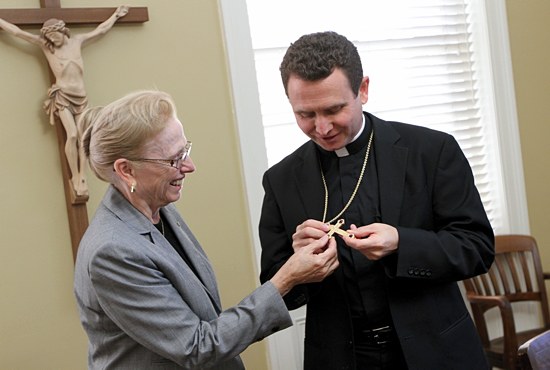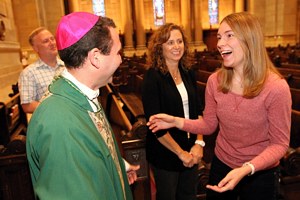
In a follow-up interview on the day Father Andrew Cozzens was appointed an auxiliary bishop of St. Paul and Minneapolis, he spoke with The Catholic Spirit about his family, his vocation, Pope Francis and a variety of other topics. The following is an edited version of the Oct. 11 interview.
How has your family been instrumental in your vocation?
I grew up in a good Catholic family. I always joke that I actually remember the one Sunday we missed Mass as a family, and it was because we tried to go but got the time wrong. It was a Sunday night and we couldn’t get to another Mass. So we all went off to confession the next weekend before going back to Mass.
My parents were a wonderful example. We were the family that always had the priest over for dinner. On Saturdays, we were working around the church. So the church was just a part of life.
As a young kid, I got to know our pastor, Msgr. [Thomas] Barry. He was also a big influence on my vocation. When I was young, I told my mom I wanted to be a priest like Msgr. Barry. My parents were always very supportive of my vocation, but they were also very clear that I didn’t have to do it.
A bishop has to have a good understanding of what priests need and face. Has teaching at the seminary given you some added insight into the priesthood that will help you as bishop?
Definitely. I’m very grateful for the seven and a half years I got to spend at the St. Paul Seminary, and I learned a lot during that time. I wrote my doctoral dissertation on the priesthood — on how the priest is meant to be a living image of Jesus the bridegroom for his Church. The priest’s own life of simplicity, obedience and celibacy — all that imitates Christ’s own spousal love for the Church.

I’ve loved teaching seminarians. I’ve loved being with them and helping form them. The image I’ve sometimes used is that every priest and every soldier wants to be on the front lines. But some people know they have to work in supply. The more I’ve worked in the seminary, the more I’ve grown to love it. It’s such a treasure to just be able to know the young priests of the archdiocese so well because they’ve all been my students.
But the other thing that has happened in the past few years is I’ve gotten involved with the Institute for Priestly Formation in Omaha. I did a 30-day retreat there, which was a very important experience in my life. Since then, I’ve helped out in education and spiritual direction, really working to help priests with their spiritual life. That will continue to be a big and important influence in my life: finding ways to help priests to develop solid spiritual lives because that really is what we need.
Of course, that’s always been a need in the lives of priests. But is it a particular challenge today and, if so, why?
What I often tell the seminarians is, ‘Priesthood today is a pressure cooker. So your weaknesses, in that pressure cooker, are going to come out.’
The pressure cooker is stronger today for many reasons. First, there are fewer priests, and so we’re busier. Second, the culture is so much more against the things that Jesus stands for. Because of that, we have to be deeper in our spiritual life in order to stand against this headwind that’s coming at us. More than ever today, we need priests who are deeply rooted in their relationship with Jesus and who are living that kind of life transparently, because that’s what the people need and that’s what the world needs — those kind of authentic witnesses.
You were appointed by Pope Francis. What are some of your thoughts about him up to this point in his pontificate?
That’s a beautiful thing for me. One of my priest friends called me today and said, ‘You’re a Pope Francis bishop.’ What he meant was love for the poor. What he meant was evangelistic — going out after the poor and being an instrument of healing. I take that very seriously.
Another huge influence in my life has been Mother Teresa’s sisters, the Missionaries of Charity. I was a confessor for the novices at the formation house in Rome. I was deeply influenced by Mother Teresa and her witness, her spirituality, her way of life.
Mother Teresa has been a big impact on me, especially the love for simplicity of life, and the love for poverty, and the love for that authentic Gospel witness, which the Missionaries of Charity live so freely.
Do you think their way of life and their spirituality is something that could help the rest of us these days?
Definitely. Pope Francis has been beautiful in the way he’s spoken. He’s stirred up a lot of controversy, which has gotten people to pay attention to him. But, as one of my priest friends said to me the other day, ‘I think he’s doing an end around on us’ — his famous comments that we don’t need necessarily always to speak about the Church’s teachings on marriage or abortion. What Pope Francis has focused on is the deep problem of materialism. That’s actually something that feeds these other things. I think materialism is a real issue for our culture, and Pope Francis is holding that up.
What I’ve tasted when I’ve been with the Missionaries of Charity is the joy of poverty, the joy of having Jesus, and not having a lot of other things that complicate your life. Of course, I need a cell phone, and a car, and email. But at least we can all take an opportunity to ask, ‘What don’t I need so that my life can be more for Jesus?’ Mother Teresa would always ask: ‘What’s taking up room in your heart that you should be giving to Jesus?’
NET Ministries and St. Paul’s Outreach are kind of the roots of your spiritual formation. What have those two organizations meant to you.
What’s beautiful about both NET Ministries and St. Paul’s Outreach is the evangelistic spirit by which they do everything — the belief that we have to get out there and share the Good News.
Pope Francis recently gave a homily in Rome, and he said, ‘You’ve all heard the parable of how the Lord left the 99 sheep to go after the one.’ He said the problem today is that the 99 are out there, and the one is here. And, here we are grooming this sheep to make sure it looks good when 99 are out there. We have to go out and get them. Basically, that’s what NET and St. Paul’s Outreach are all about. That’s certainly what they’ve taught me, but also what I hope I can help them to continue to do — to preach the Gospel to young people especially.
Do you think your presence here as a bishop is going to move that forward even more, not just for those organizations, but for the Church as a whole?
I hope to help. I’ve been very impressed with the Rediscover: effort that the archdiocese has rolled out, and that’s the sort of thing we need to continue. We need to continue to find ways to reach out to those people who are, as Pope Francis says, on the existential peripheries. We need to reach them and show them the healing power of Jesus.
You speak fluent Spanish. What would you like to see happen in Latino ministry here?
The first thing I’ll do is get to know the good people who are doing it and see how I can help. Obviously the whole country needs to take account of the fact that Latinos are a large part of our Catholic faith, and they’re our brothers and sisters and they have beautiful things to share with us. They can teach us about the importance of family. They can teach us about the importance of spirituality in terms of the great devotional life they have. They can teach us how faith roots itself in the everyday world. So one of my main goals will just be to assist Father Kevin Kenney who is the vicar of Hispanic ministry, and the whole Hispanic ministry team.
Please comment on the Companions of Christ. You’re one of the founding members. A lot of people might have heard of it but they don’t know what it is.
The Companions of Christ is a fraternity of diocesan priests. Whenever possible, we try to live together, we have a common rule of life, and we basically try to live a deep life of fraternal accountability. What that means is that I allow my brothers to know my life and to support me in trying to live the ideals that we have all commonly agreed to as priests. So the Companions of Christ were founded 20 years ago — we’re just about to celebrate our 21st anniversary. Archbishop [Robert] Carlson, who was at that time the auxiliary bishop here, was very influential in helping us get founded.
It’s been really my privilege that as a priest I’ve always been able to live in community with other priests. It’s not always the case because the Companions of Christ serve at the discretion of the bishop, and we’re fully diocesan priests. So we know diocesan priests are stretched. We won’t always get to live together. But, whenever possible, we seek to live together. And, as part of our daily life, we have a morning holy hour before the Blessed Sacrament, and then we try to have three or four meals together each week, and just try to pray together whenever possible.
And, then, every other week we gather for a fraternal group, where we have accountability and support. That’s just a place where we’re able to share our lives freely and to receive the accountability and support to live transparency, to live what we need in order to help each other live the high ideals of the priesthood.
Is there anything else you want to say?
I would just say one more thing about the Companions of Christ. I’m committed to find ways to try to help to support priests. The Companions of Christ is one way to do that. I just think it’s very important that priests find the support they need.
I would simply want to say to the people of the archdiocese, ‘Please pray for me.’ I’m very grateful to God to be called to serve in this way. I’m also very aware of the weight of apostolic office and what that means for the Church and the world. I count on the prayers of the people of the archdiocese, and I very much look forward to meeting more people of the archdiocese and sharing with them the healing love of Jesus.



